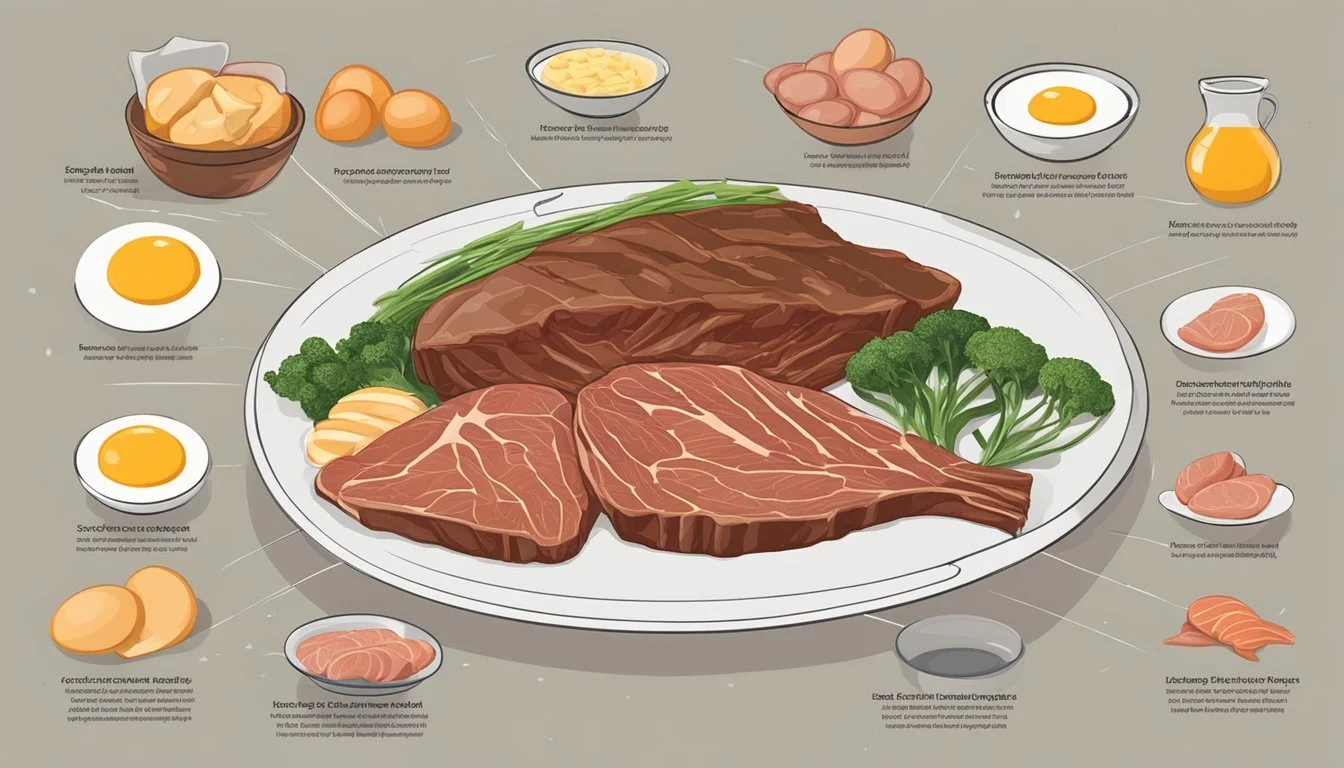8 Carnivore Diet-Friendly Foods for Better Liver Health
Essential Choices
Navigating the landscape of dietary choices can be challenging, especially when it comes to ensuring liver health. The carnivore diet, known for its focus on animal-derived foods, presents unique benefits and considerations for liver function. This article explores 8 specific foods within the carnivore diet that may support and improve liver health.
For those adhering to the carnivore diet or considering it, understanding which foods can positively impact liver health is crucial. Limiting carbohydrates and emphasizing high-quality proteins and fats can offer advantages, but the selection of specific foods plays a critical role.
1) Grass-Fed Beef Liver
Grass-fed beef liver stands out as one of the most nutrient-dense foods suitable for a carnivore diet. It is rich in essential vitamins such as A, D, E, and K, which play a critical role in maintaining liver health.
High in protein, grass-fed beef liver provides necessary amino acids that support overall bodily functions. This makes it an excellent dietary choice for those looking to optimize their nutrient intake.
Grass-fed beef liver also boasts a substantial amount of minerals like iron, zinc, and copper. These minerals are vital for red blood cell production, immune function, and overall well-being.
Cooking methods for grass-fed beef liver are varied. It can be sautéed, seared, or pan-fried. Using butter or lard to cook it enhances its flavor and texture, making it more palatable for those new to incorporating liver into their diet.
The liver is an excellent source of glutathione. This antioxidant helps protect gut cells from damage and reduces gut inflammation. This can lead to better digestive health and nutrient absorption.
With its rich nutrient profile and versatile cooking options, grass-fed beef liver remains a top recommendation for anyone following a carnivore diet. It's both a practical and nutritious choice.
2) Wild Caught Salmon
Wild caught salmon is an excellent choice for those on a carnivore diet aiming to support liver health. Renowned for its nutritional benefits, this fish provides high-quality protein that aids in liver repair and function.
Salmon is rich in omega-3 fatty acids, which are known to reduce inflammation. This anti-inflammatory property is particularly beneficial for the liver, as chronic inflammation can lead to liver damage over time.
In addition to omega-3s, wild caught salmon is a good source of essential vitamins and minerals. It contains B vitamins, particularly B6 and B12, which are crucial for metabolic processes and overall liver function.
The selenium found in salmon is another important nutrient. Selenium acts as an antioxidant, helping to protect the liver from oxidative stress. This can prevent cellular damage and support liver health.
Furthermore, wild caught salmon provides a moderate amount of healthy fats. These fats not only contribute to heart health but also play a role in energy metabolism and nutrient absorption, essential functions that involve the liver.
Incorporating wild caught salmon into a carnivore diet ensures the body receives these critical nutrients, thus promoting better liver health and function. This makes it a valuable food option for those focused on maintaining or improving liver health through their dietary choices.
3) Free-Range Chicken Thighs
Free-range chicken thighs are a valuable addition to a carnivore diet aimed at improving liver health. These thighs are not only high in protein but also packed with essential vitamins and minerals.
They contain significant amounts of B vitamins, such as B6 and B12, which help in various metabolic processes within the liver. Vitamin B6 assists in amino acid metabolism, while B12 supports DNA synthesis and red blood cell formation.
Free-range chicken thighs are also rich in zinc, which plays a crucial role in liver function and repair. Zinc helps in maintaining proper enzyme function and supports the immune system.
Cooking methods matter. Opt for baking or roasting at moderate temperatures. For instance, baking chicken thighs at 375°F (190°C) ensures they remain tender. Consider seasoning with simple spices like paprika and thyme for added flavor without compromising their nutritional benefits.
Additionally, free-range chicken is less likely to contain harmful additives and antibiotics compared to conventionally raised chicken, which is important for liver health. Making this choice supports not only personal health but also animal welfare.
Incorporating free-range chicken thighs into a carnivore diet can be an effective strategy for those looking to support liver health through nutrient-rich, ethically sourced meat.
4) Organic Kale
Organic kale, although not a part of a traditional carnivore diet, is widely recognized for its nutrient density. It is rich in vitamins A, C, and K, which support overall health. Kale also contains antioxidants that help combat oxidative stress, which can benefit liver function.
Kale's high fiber content supports healthy digestion and aids in the removal of toxins from the body. This is particularly beneficial for liver health as it helps reduce the liver's detoxification workload.
Despite its benefits, those on a strict carnivore diet should avoid kale due to its plant origin. Nonetheless, understanding its nutritional profile can be useful for those considering reintroducing plant-based foods in the future.
5) Spinach
Spinach, while nutrient-dense, is not typically included in a strict carnivore diet as it is a plant-based food.
Rich in vitamins A, C, and K, spinach also contains significant amounts of iron and calcium.
Despite its health benefits, spinach is avoided in the carnivore diet, which focuses exclusively on animal products.
For those committed to the carnivore approach, maintaining liver health means relying on nutrient-rich animal sources instead.
6) Beet Greens
Beet greens are an excellent choice for those following a carnivore diet and looking to enhance their liver health. These leafy greens are rich in nutrients and offer a variety of benefits.
High in Vitamin C, beet greens can help boost the immune system. This anti-oxidant vitamin is essential for protecting the body from illness.
Beet greens are particularly notable for their Vitamin K content. This nutrient supports blood clotting and bone health, and just 100 grams of beet greens can provide more than 300% of the daily value for Vitamin K.
Additionally, beet greens contain iron and minimal sugars, making them a wholesome addition without added health concerns. Their fiber content aids in maintaining healthy digestion and supporting liver function.
These greens can be easily incorporated into meals. They can be sautéed with garlic and olive oil or added to soups and stews, offering a nutritious and liver-friendly option for those on a carnivore diet.
7) Egg Yolks
Egg yolks are a highly nutritious addition to the carnivore diet, offering numerous benefits for liver health. Rich in essential vitamins and minerals, they provide substantial amounts of vitamin A, B vitamins, and choline. These nutrients play critical roles in liver function and overall metabolic health.
Choline, in particular, is crucial as it helps in the transport and metabolism of fats. This can prevent fat accumulation in the liver, reducing the risk of fatty liver disease. Additionally, vitamin A supports liver detoxification processes and immune function.
Egg yolks also contain antioxidants like lutein and zeaxanthin. These antioxidants help protect liver cells from oxidative stress and inflammation, promoting better liver health.
They're versatile and easy to incorporate into various dishes. Whether consumed raw, cooked, or blended into recipes, egg yolks can easily fit into daily dietary routines. They add richness and creaminess to meals, making them a popular choice among those following a carnivore diet.
8) Mackerel
Mackerel, a nutrient-dense fish, plays a vital role in supporting liver health. Rich in omega-3 fatty acids, EPA, and DHA, it helps reduce liver inflammation and promotes overall liver function.
This fish is an excellent source of vitamin D, which is crucial for liver health. Vitamin D helps regulate liver enzyme production, supporting optimal liver function.
Mackerel also provides essential proteins and minerals like selenium. Selenium acts as an antioxidant, protecting the liver from oxidative stress and potential damage.
Incorporating mackerel into the diet can be simple and beneficial. Its high nutrient content supports various liver functions and enhances overall health.
Understanding the Carnivore Diet
The carnivore diet focuses on eating only animal products. Its advocates believe it can significantly improve health by simplifying food choices and reducing intake of potentially harmful compounds found in plants.
Basics of the Carnivore Diet
The carnivore diet includes meat, fish, eggs, and animal fats. The elimination of plant-based foods means it is a zero-carb diet, heavily reliant on protein and fat. Beef, pork, lamb, and poultry are staple choices. Dairy is sometimes included but is often limited to high-fat options like butter and cheese.
Meals typically consist of grilled or roasted meats. Cooking methods such as sautéing in animal fat or grilling are preferred to maintain the nutrient profile of the meats. Seasonings are minimal, often restricted to salt and pepper.
Health Benefits of the Carnivore Diet
Proponents of the carnivore diet argue it leads to numerous health benefits, particularly improved mental clarity, enhanced digestion, and weight loss. By eliminating plant foods, individuals may also experience a reduction in autoimmune symptoms as potential irritants like lectins and oxalates are excluded.
The diet is noted for its high bioavailability of nutrients required for muscle maintenance and repair. Concentrated sources of vitamins like B12 and essential minerals like iron and zinc are inherent to the diet, potentially leading to better energy levels.
While fiber is absent, the consumption of fatty cuts of meat provides sufficient short-chain fatty acids that support gut health. This dietary approach can significantly reduce inflammatory markers, contributing to overall well-being.
The Liver and Its Functions
The liver is an essential organ that performs numerous tasks vital to health, such as detoxification and metabolism. Maintaining liver health, especially when following specific diets like the carnivore diet, is crucial for optimal bodily functions.
Overview of Liver Functions
The liver acts as a powerhouse for various metabolic processes. It metabolizes fats, carbohydrates, and proteins, breaking down these macronutrients into usable forms of energy or storage.
Moreover, the liver is responsible for detoxification. It filters out toxins and waste products from the blood, converting harmful substances into less toxic compounds, which can be excreted. This detoxification process involves phase 1 and phase 2 detoxification pathways, requiring essential nutrients like B-vitamins.
Another critical function is the production of bile. Bile aids in the digestion and absorption of fats and fat-soluble vitamins. The liver also stores vitamins and minerals and regulates cholesterol levels, playing a pivotal role in maintaining overall metabolic health.
Importance of Liver Health
Healthy liver function is vital for overall well-being. A compromised liver can result in the buildup of toxins, leading to a range of health issues such as fatigue, digestive problems, and impaired immune function.
Various factors can impact liver health, including diet, lifestyle choices, and environmental toxins. A diet rich in essential nutrients and low in harmful substances can support liver health. Foods rich in amino acids, vitamins, and minerals, such as those found in the carnivore diet, can promote healthy liver function by providing the nutrients necessary for effective detoxification and metabolic processes.
Additionally, maintaining a healthy weight, avoiding excessive alcohol consumption, and regular exercise are crucial for sustaining liver health. Proper liver care ensures the body can efficiently process nutrients, eliminate toxins, and maintain metabolic harmony.
How the Carnivore Diet Supports Liver Health
The carnivore diet, by focusing exclusively on animal-derived foods, supplies essential nutrients that can bolster liver function. Key areas to consider include the nutritional components beneficial to liver health and the research findings supporting the connection between the diet and liver function.
Nutritional Components Beneficial to Liver
The carnivore diet emphasizes high intake of protein and fats from meat, fish, and dairy. Amino acids found in proteins are crucial for liver detoxification stages. B-vitamins, especially available in organ meats like liver, assist metabolic pathways that support liver detoxification processes.
Diets high in omega-3 fatty acids, present in fatty fish, reduce inflammation, benefiting liver health. Furthermore, animal-based foods provide choline, an essential nutrient for fat metabolism, preventing fatty liver disease. Including these specific nutrients helps maintain and improve liver function.
Research and Studies on Diet and Liver Health
Studies indicate that high-protein diets can enhance the liver's detoxification process. Research shows that increased amino acid intake supports phase 1 and phase 2 liver detoxification. Studies on the carnivore diet suggest individuals may experience reduced liver inflammation due to the anti-inflammatory properties of omega-3 fatty acids.
Evidence also highlights the impact of choline on liver health. Diets sufficient in choline help prevent non-alcoholic fatty liver disease. Clinical observations have shown that individuals with liver conditions, such as cirrhosis, report improvements when switching to carnivore dietary patterns, emphasizing the potential benefits of animal-derived nutrients on liver health.
Incorporating and understanding these elements can guide those on the carnivore diet to better manage and support their liver function efficiently.









